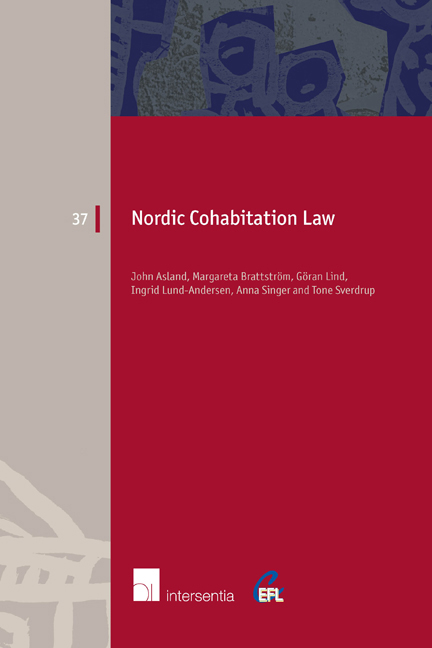Book contents
- Frontmatter
- Preface
- Contents
- Table of Cases
- List of Abbreviations
- Chapter 1 The Development of Cohabitation and Cohabitation Law in the Nordic Countries
- Chapter 2 Property Issues in Cohabitation Relationships
- Chapter 3 Financial Settlements on Termination of Cohabitation
- Chapter 4 The Legal Position of the Surviving Cohabitant
- Chapter 5 The Relevance of Cohabitation for Parental Rights
- Chapter 6 The Distinctive Legal Nature of Cohabitation Relationships and the Need for Legislation
- Chapter 7 Discussion of Legal Policy: Principles for Regulating Cohabitation Relationships
- References
- About the Authors
- European Family Law Series
Chapter 2 - Property Issues in Cohabitation Relationships
Published online by Cambridge University Press: 13 December 2017
- Frontmatter
- Preface
- Contents
- Table of Cases
- List of Abbreviations
- Chapter 1 The Development of Cohabitation and Cohabitation Law in the Nordic Countries
- Chapter 2 Property Issues in Cohabitation Relationships
- Chapter 3 Financial Settlements on Termination of Cohabitation
- Chapter 4 The Legal Position of the Surviving Cohabitant
- Chapter 5 The Relevance of Cohabitation for Parental Rights
- Chapter 6 The Distinctive Legal Nature of Cohabitation Relationships and the Need for Legislation
- Chapter 7 Discussion of Legal Policy: Principles for Regulating Cohabitation Relationships
- References
- About the Authors
- European Family Law Series
Summary
INTRODUCTION
In the Nordic countries, there are few specific provisions in law that regulate property issues for couples in permanent or long-term cohabitation relationships. The opposite is the case for married couples. Marital law contains an entire system of regulations relating to property which governs both relations between spouses and relations between individual spouses and third parties. Since there are frequently no rules governing cohabitation relationships the general principles of the law of property are applied to property issues that affect cohabitants. At first glance the difference between cohabitants and spouses would appear to have few practical consequences as general property law applies to both categories. For both cohabitants and spouses, the main rules are that:
– each individual owns his or her own property and has liberty to dispose of it;
– each individual is liable for his or her own debts but not for the other party's debts; and
– couples are entitled to enter into agreements with one another in respect of the law of property.
Cohabitants composed with spouses: It must be assumed that in many respects there are general similarities between the ways in which cohabitants and married couples organise their lives. Yet despite this, the view thus far has been that family law rules governing spouses should not be applied analogously to cohabitants; they must at any rate be applied with great care. One argument in favour of the current system is that there is a clear formal requirement, in order for a marriage to exist, in the form of a valid marriage ceremony. Cohabitants have not manifested their relationship in a similar manner. That they have not married may be because they do not wish the legal rules that apply to marriage to be applied to their relationship, or as they have quite simply not decided whether they want their relationship to be governed by law. Expanding the application of the rules that apply to spouses to include cohabitants should, therefore, according to current thinking, require legislation. This has already occurred to some extent, but primarily where issues other than property issues in cohabitation relationships have been concerned. There are, however, examples from case law where property issues between cohabitants have been settled on the basis of considerations that more closely resemble the particular principles that apply between spouses than the general principles of the law of property.
- Type
- Chapter
- Information
- Nordic Cohabitation Law , pp. 57 - 108Publisher: IntersentiaPrint publication year: 2015



